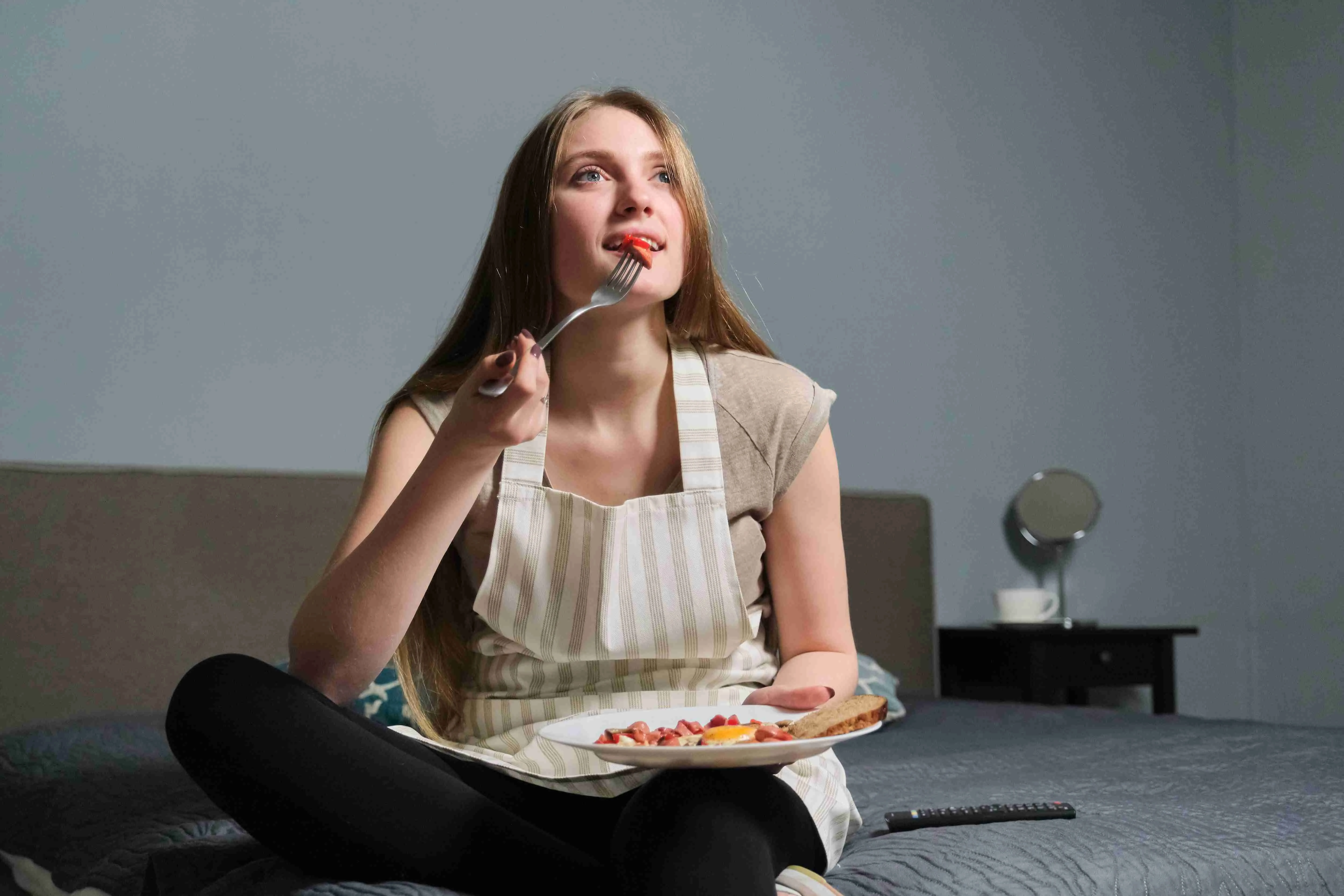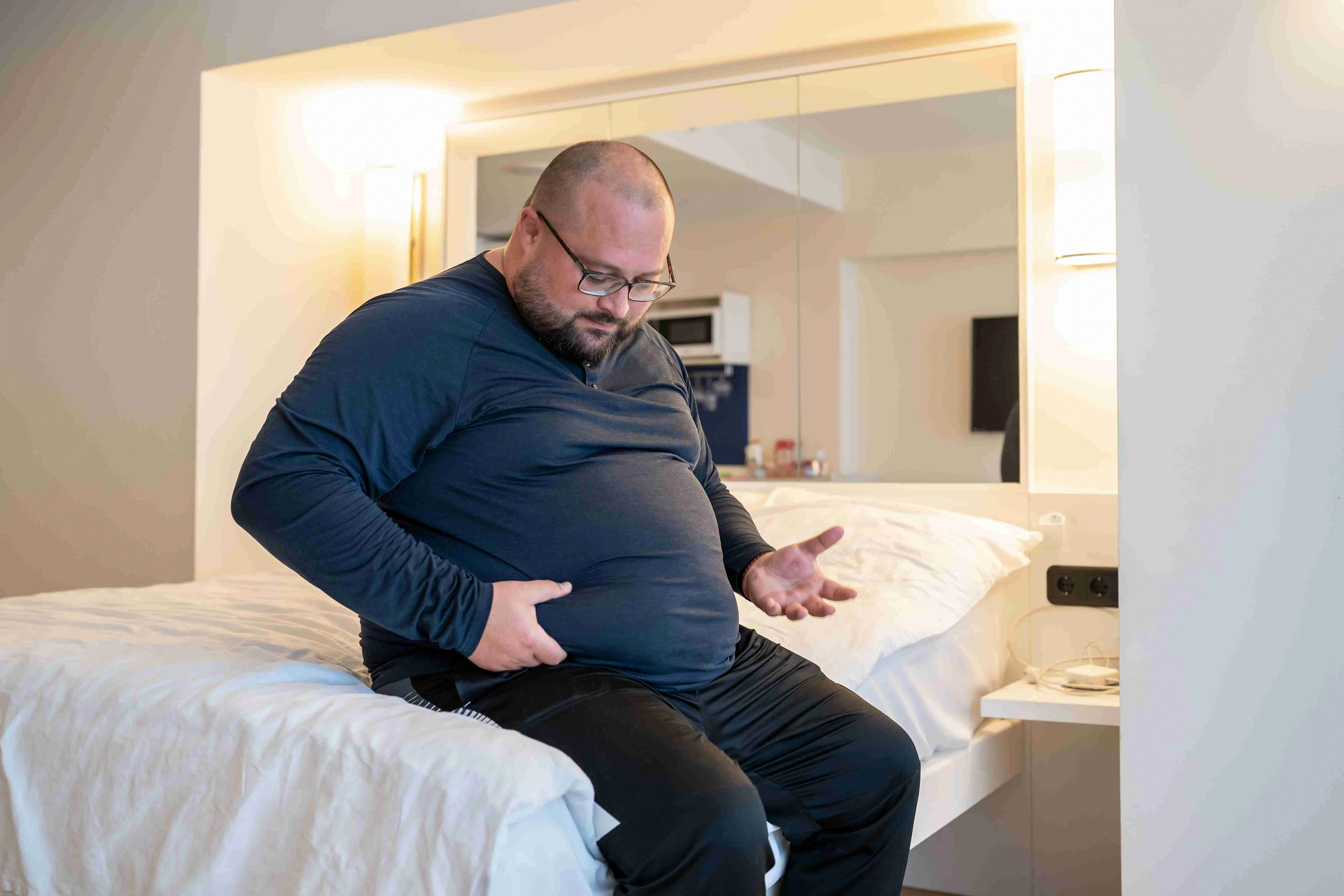While some argue that a bedtime snack can improve sleep quality and metabolism, others claim that eating before bed leads to weight gain, poor nutrition, and poor sleep.
In this article, we'll dive deep into the concept of eating before bed, exploring its effects on weight management, digestion, sleep quality, and overall health.
Key Takeaways
- Eating before bed can be either bad or good, depending on individual health needs.
- Nutrient-dense meals can stabilize your blood sugar levels and also help you fall asleep a lot faster.
- Some negative effects of eating before bed include weight gain, bad sleep and heartburn or acid reflux.
- According to experts, eat at least 2-3 hours before bed to avoid any negative effects.
How Late is Too Late to Eat?
Many dietary experts recommend you eat the last meal of the day 2-3 hours before bed. So, if you sleep at 10.pm, your last meal should be on or before 8pm. Having enough time between eating and laying down to sleep reduces the risk experiencing of poor sleep or acid reflux.
However, for people suffering from health conditions, especially those related to blood sugar management, experts may recommend a healthy snack closer to their bed time.
What Happens if You Eat Before Bed?

Eating before bed can have various effects on your body, both positive and negative, depending on what and how much you eat. Here are some key points to consider:
Weight Gain
Eating before bed is associated with potential weight gain, though the relationship is complex due to the following reasons:
- Calorie Intake: Late-night eating can lead to consuming extra calories beyond daily needs, potentially contributing to weight gain over time.
- Metabolism: While it's often believed that metabolism slows significantly during sleep, the nighttime basal metabolic rate is nearly as high as during the day.
- Habits: Weight gain from eating before bed is often linked to habits like snacking while watching TV or overeating due to nighttime hunger, rather than metabolism changes.
- Hormones: Evening stress can increase ghrelin (hunger hormone) levels, making night eating syndrome more likely.
Impact on Digestion
When it comes to digestion and eating before bed, there are a few factors to consider:
- Portion Size: The quantity of food consumed before bed plays a significant role in how well it is digested. Consuming large, heavy meals close to bedtime can overwhelm the digestive system and potentially lead to discomfort, heartburn, or indigestion.
- Food Choices: The types of foods you choose to eat before bed can also impact digestion. Foods high in fat, sugar, or spices may be more challenging to digest and could potentially cause discomfort or disrupted sleep. On the other hand, lighter, easily digestible foods like fruits, vegetables, or lean proteins may be better tolerated.
- Individual Differences: It's important to recognize that each person's digestive system is unique. Some individuals may experience no issues with eating before bed, while others may be more sensitive to certain foods or the timing of their meals.
Blood Sugar Levels and Metabolism
Eating before bed can impact blood sugar and metabolism:
- Insulin Sensitivity: At night, the body's sensitivity to insulin decreases, increasing the likelihood of storing calories as fat instead of burning them for energy.
- Morning Blood Sugar: For people with diabetes, a bedtime snack might help stabilize morning blood sugar levels.
- Metabolic Rate: While metabolism doesn't drastically slow during sleep, the body's ability to process food efficiently may be reduced compared to daytime hours.
Influence on Sleep Quality
The relationship between eating before bed and sleep quality is often debated. While some claim that eating before bed can disrupt sleep patterns, others suggest that a small, well-timed snack promotes better sleep.
When Eating Before Bed Can Be Beneficial

Eating before bed can be beneficial in certain situations, and it's important to consider the context and the type of food consumed. Here are some scenarios where eating before bed might be advantageous:
For People with Specific Health Conditions
Eating before bed can be particularly beneficial for individuals with certain health conditions. For people with diabetes, a small bedtime snack may help stabilize morning blood sugar levels and prevent nocturnal hypoglycemia.
This is especially important for those who experience the Dawn Phenomenon, where blood sugar rises in the early morning hours. A carefully chosen bedtime snack can provide an additional energy source to help manage blood glucose throughout the night.
Healthy Snacks
If you find yourself craving a late-night snack, it's essential to make wise choices that support your overall health and wellness goals. Here are some healthy bedtime snacks to consider snacking on 20 minutes to an hour before sleeping:
- Fresh Fruits and Vegetables: Fruits and vegetables are excellent late-night snack choices due to their high fiber and water content, which can help promote feelings of fullness and hydration. Some great options include berries, apple slices, carrots, or cucumber slices.
- Whole Grains and Lean Proteins: Combining whole grains with lean proteins can provide a satisfying and nutrient-dense snack before bed. Examples include whole-grain toast with a smear of nut butter, a small portion of oatmeal with berries, or a hard-boiled egg with whole-grain crackers.
- Yogurt and Nuts: Greek yogurt or low-fat cottage cheese paired with a handful of nuts or seeds can be a delicious and filling late-night snack. The combination of protein, healthy fats, and carbohydrates can help keep you satisfied until morning.
Common Eating Mistakes to Avoid
Eating before bed isn't always harmful, especially when done correctly, as discussed earlier. However, if you do find yourself eating late, it's crucial to avoid the following mistakes to minimize any negative impact on your health.
Overeating
Overeating before bed is a common mistake that can lead to various issues:
- Discomfort: Consuming large portions close to bedtime can cause physical discomfort, making it difficult to fall asleep or stay asleep throughout the night.
- Digestive Issues: The body's digestive processes slow down during sleep. Overeating before bed can overwhelm the digestive system, potentially leading to indigestion, acid reflux, or heartburn.
- Weight Gain: Consistently overeating before bed can contribute to weight gain over time, as the body has less opportunity to burn off excess calories during sleep.
- Sleep Quality: Large meals before bed can disrupt sleep cycles, leading to poor sleep quality and daytime fatigue.
To avoid overeating, stick to small, nutrient-dense snacks if you must eat before bed. Pay attention to portion sizes and listen to your body's hunger cues.
Consuming Sugary or Caffeinated Foods
Eating sugary or caffeinated foods before bed can significantly impact your sleep:
- Blood Sugar Spikes: Sugary foods can cause rapid spikes and drops in blood sugar levels, which may lead to restlessness and difficulty staying asleep.
- Caffeine Effects: Caffeine is a stimulant that can remain in your system for several hours, making it harder to fall asleep and potentially reducing sleep quality.
- Hidden Sources: Be aware of hidden sources of caffeine and sugar in foods and drinks like chocolate, some teas, and certain medications.
Instead of sugary or caffeinated options, choose foods that promote sleep, such as those rich in tryptophan, magnesium, or complex carbohydrates.
Timing Your Snack Poorly
The timing of your bedtime snack is crucial:
- Eating Too Close to Bedtime: Eating food immediately before bed can increase the risk of acid reflux and indigestion.
- Eating Too Early: On the other hand, eating too early might lead to hunger pangs that wake you up in the middle of the night.
- Inconsistent Timing: Irregular eating patterns can disrupt your body's internal clock and affect sleep quality.
The ideal timing for a bedtime snack is typically about 1-2 hours before sleep. This allows for some digestion to occur while still providing the potential benefits of a pre-bed snack
Does Eating Before Bed Make You Gain Weight?

While the timing of meals is not the sole determinant of weight fluctuations, it's crucial to understand the factors that contribute to this relationship:
- Calorie Balance: As mentioned earlier, weight gain or loss ultimately comes down to balancing calorie intake and expenditure. You may gain weight if you consume more calories than your body burns, regardless of the timing. Conversely, if you maintain a calorie deficit, you can lose weight, even if you eat before bed.
- Metabolic Rate: Eating before bed may slightly impact metabolic rate and calorie burning. However, the effects are generally minimal and can vary depending on individual factors such as age, activity levels, and overall diet composition.
- Food Choices and Portion Control: The types of foods and portion sizes consumed before bed can also play a role in weight management. Choosing nutrient-dense, high-fiber snacks or meals can help promote satiety and prevent overeating. On the other hand, indulging in high-calorie, processed foods before bed may contribute to excess calorie intake and potential weight gain over time.
Risks of Eating Before Bed
While eating before bed may be acceptable for most individuals, there are certain dietary considerations and health conditions that may warrant additional caution or guidance from a healthcare professional:
Acid Reflux and Heartburn
For individuals prone to acid reflux or heartburn, eating before bed requires special consideration:
- Timing: It's generally recommended to finish eating at least 3 hours before lying down to reduce the risk of acid reflux.
- Food Choices: Certain foods can trigger or worsen symptoms and should be avoided close to bedtime, like acidic foods like citrus fruits and tomatoes, spicy foods, high-fat foods, and alcohol.
- Portion Size: Smaller portions are less likely to cause reflux symptoms.
- Elevation: If eating closer to bedtime is necessary, consider elevating the head of the bed to reduce the likelihood of acid reflux.
Diabetes Management
For people with diabetes, eating before bed can impact blood sugar management:
- Blood Sugar Stability: A small, balanced snack before bed might help stabilize blood sugar levels overnight, particularly for those prone to nocturnal hypoglycemia.
- Carbohydrate Control: Choose snacks that combine complex carbohydrates with protein to help maintain steady blood sugar levels.
- Timing: Consistent timing of meals and snacks, including bedtime snacks, can aid in blood sugar management.
- Monitoring: Regular blood sugar monitoring can help determine the impact of bedtime eating on individual glucose levels.
Digestive Disorders
For those with digestive disorders, eating before bed requires careful consideration:
- Irritable Bowel Syndrome (IBS): Eating too close to bedtime may exacerbate symptoms for some IBS sufferers. It's often recommended to allow 2-3 hours between eating and sleeping.
- Inflammatory Bowel Disease (IBD): While there's no universal rule, many with IBD find that avoiding large meals close to bedtime can help manage symptoms.
- Gastroparesis: Eating too close to bedtime can lead to increased discomfort for those with delayed gastric emptying. Smaller, more frequent meals throughout the day may be preferable.
- Food Sensitivities: Individuals with specific food sensitivities should be particularly cautious about consuming trigger foods close to bedtime, as symptoms may interfere with sleep
FAQs
Does eating before bed make you gain weight?
Eating before bed alone does not directly cause weight gain. The overall calorie balance between food intake and energy expenditure is what primarily determines weight fluctuations. However, consuming excessive calories, particularly from high-calorie, nutrient-poor foods, before bed can contribute to weight gain over time.
Is it better to skip late-night snacks altogether?
Skipping late-night snacks is not necessarily better or worse for overall health. If you're truly hungry or have specific dietary needs, a small, nutrient-dense snack before bed can be beneficial. However, if you're simply snacking out of habit or boredom, it may be better to avoid unnecessary calorie intake.
Can you eat before bed, or it can disrupt sleep quality?
For most individuals, moderate eating before bed is unlikely to significantly disrupt sleep quality. However, consuming large, heavy meals or certain foods that may cause discomfort (e.g., spicy or greasy foods) close to bedtime could potentially interfere with sleep. It's essential to pay attention to your individual tolerance and adjust your habits accordingly.
Is eating before bed bad? Are there any specific foods to avoid before bed?
While individual tolerances may vary, it's generally recommended to avoid foods that are high in fat, sugar, or spices, as well as caffeinated beverages, as these can potentially cause discomfort or disrupt sleep patterns. Additionally, foods that are known to trigger digestive issues or allergies should be avoided before bed.
Does eating before bed affect sleep?
In some cases, moderate eating before bed can have positive effects. For example, a small, protein-rich snack before bed may help promote feelings of fullness and better sleep quality for some individuals. Additionally, healthcare professionals might advise a bedtime snack for people with particular dietary needs or medical conditions.
Conclusion
The key takeaway is that moderation and mindfulness are crucial. If you choose to eat before bed, opt for small portions of nutrient-dense foods, and time your snack about 2-3 hours before sleep.
Pay attention to how your body responds and be willing to adjust your habits accordingly. Remember, what works for one person may not work for another, so it's essential to listen to your body.
Helene Josephine Duun
Helene Josephine Duun is a medical anthropologist who specializes in public health research and communication. Always seeking a deeper understanding of how cultural values and practices influence health outcomes, she co-designs solutions with diverse groups to form collaborative partnerships that are responsive to changing needs. As an advocate for holistic health literacy, she also raises awareness of the vital role of quality sleep in overall health and well-being.


